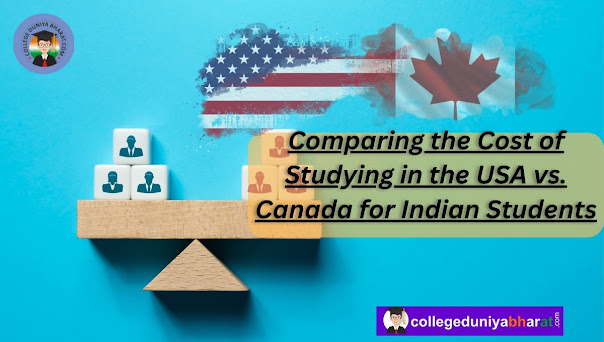Comparing the Cost of Studying in the USA vs. Canada for Indian Students
Choosing between the USA and Canada for higher education can be a challenging decision for Indian students. Both countries offer world-class education, cultural diversity, and excellent post-study opportunities. However, the costs involved can significantly influence this choice. Here's a detailed comparison of the cost of studying in the USA and Canada for Indian students.
1. Tuition Fees
-
USA:
- Tuition fees vary widely depending on the institution and program. On average:
- Undergraduate programs: $20,000-$50,000 per year.
- Graduate programs: $25,000-$60,000 per year.
- Ivy League and private universities often charge higher fees.
- Tuition fees vary widely depending on the institution and program. On average:
-
Canada:
- Tuition fees are generally more affordable. On average:
- Undergraduate programs: CAD 15,000-CAD 30,000 per year.
- Graduate programs: CAD 10,000-CAD 25,000 per year.
- Public universities in Canada are more budget-friendly compared to private institutions.
- Tuition fees are generally more affordable. On average:
Winner: Canada is more affordable in terms of tuition fees.
2. Cost of Living
-
USA:
- Living costs vary significantly by location. Major cities like New York and San Francisco are more expensive.
- Average monthly expenses: $1,000-$2,500 (including accommodation, food, and transportation).
-
Canada:
- Living costs are generally lower than in the USA. Cities like Toronto and Vancouver are pricier, but smaller towns are more affordable.
- Average monthly expenses: CAD 800-CAD 1,500.
Winner: Canada has a lower cost of living for most students.
3. Scholarships and Financial Aid
-
USA:
- Offers a wide range of scholarships for international students, including merit-based, need-based, and program-specific awards.
- Prestigious scholarships include Fulbright Scholarships and university-specific grants.
-
Canada:
- Also provides numerous scholarships, such as the Canada Graduate Scholarships and university-specific awards.
- Canadian government-funded scholarships are highly accessible to Indian students.
Winner: Both countries offer excellent scholarship opportunities, making this a tie.
4. Part-Time Work Opportunities
-
USA:
- Students can work up to 20 hours per week during the academic term and full-time during breaks.
- On-campus jobs are more common for international students.
-
Canada:
- Students can also work up to 20 hours per week during the academic term and full-time during breaks.
- Canada allows off-campus work without a separate work permit, making it easier for students to find jobs.
Winner: Canada offers more flexibility in part-time work options.
Read more...5. Post-Graduation Work Opportunities
-
USA:
- International students can apply for Optional Practical Training (OPT) for up to 12 months after graduation.
- STEM graduates can extend OPT by an additional 24 months.
- H-1B visa offers a pathway to long-term employment, but it’s highly competitive.
-
Canada:
- Post-Graduation Work Permit (PGWP) allows students to work in Canada for up to three years after graduation.
- The Express Entry system and Provincial Nominee Programs (PNPs) make it easier for graduates to apply for permanent residency.
Winner: Canada provides more accessible post-graduation work and immigration pathways.
6. Healthcare Costs
-
USA:
- Health insurance is mandatory, and costs range from $700-$2,000 annually.
- Coverage depends on the university and state.
-
Canada:
- Health insurance is also mandatory, but costs are lower at CAD 600-CAD 900 annually.
- Some provinces, like Alberta and British Columbia, offer free healthcare to international students.
Winner: Canada has lower healthcare costs and better coverage options.
7. Visa Fees and Processing
-
USA:
- F-1 visa application fee: $160.
- Additional costs for SEVIS fee: $350.
- Visa interviews are mandatory.
-
Canada:
- Study permit application fee: CAD 150.
- Biometric fee: CAD 85.
- No interview required in most cases.
Winner: Canada has a simpler and more affordable visa process.
Final Verdict
- Choose the USA if: You aim for top-ranked universities, especially in STEM fields, and are prepared for higher costs in exchange for global recognition.
- Choose Canada if: You prioritize affordability, accessible immigration pathways, and a high quality of life.
Studying abroad is a significant investment, and the choice between the USA and Canada depends on individual priorities and financial capabilities. Carefully evaluate tuition fees, living expenses, and post-study opportunities to make an informed decision. Both countries offer excellent education systems that can pave the way for a successful future.

